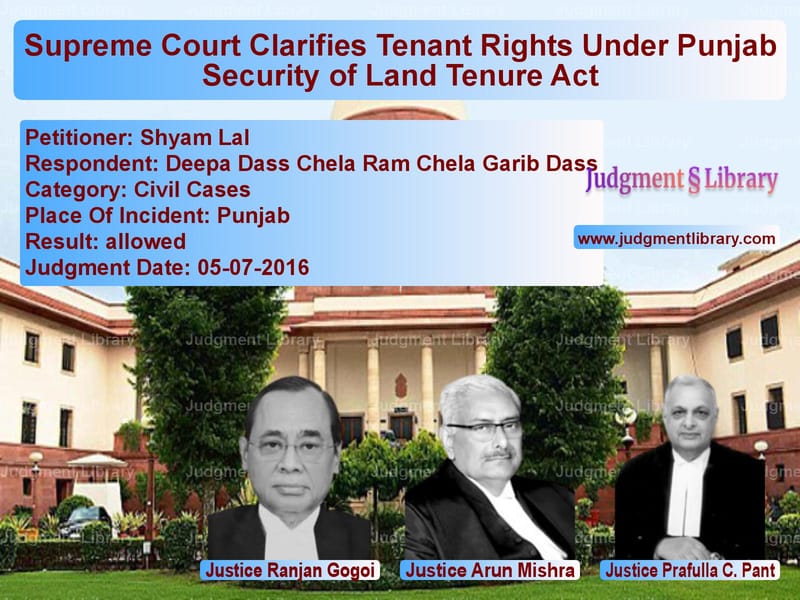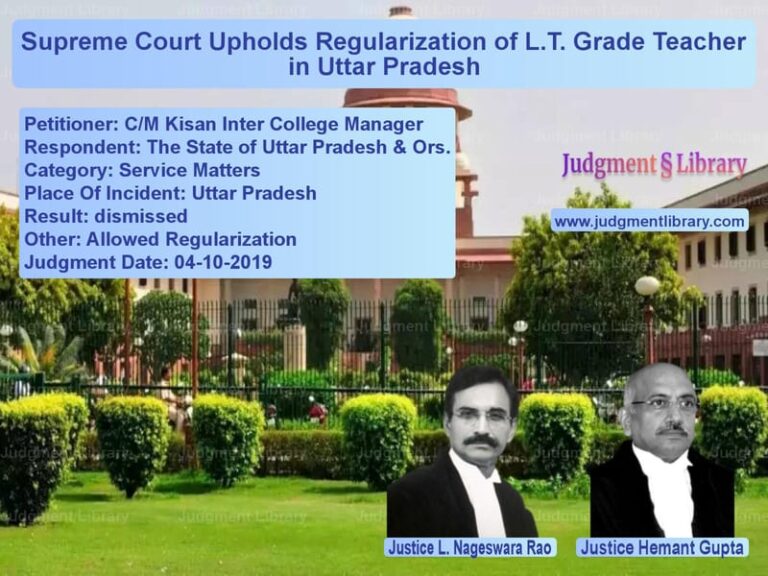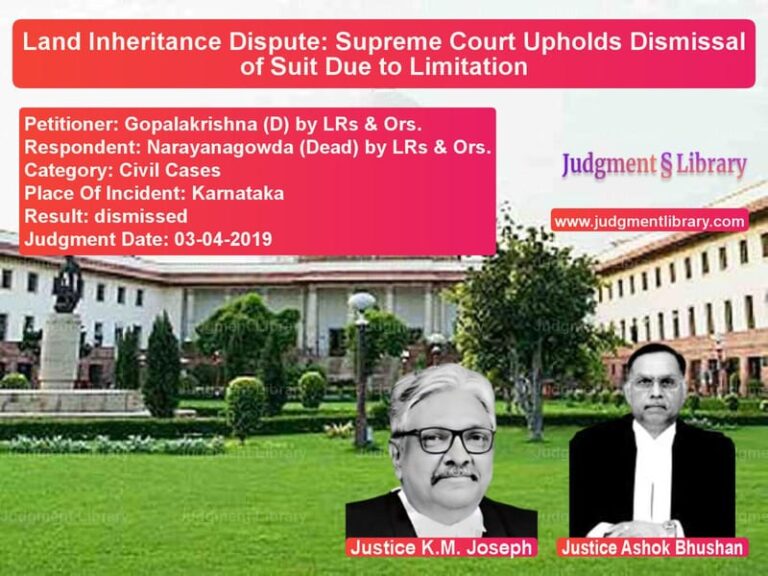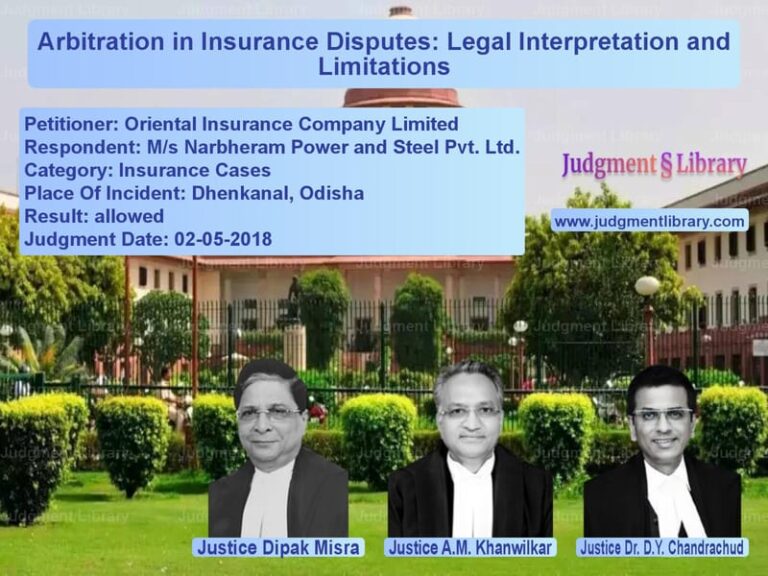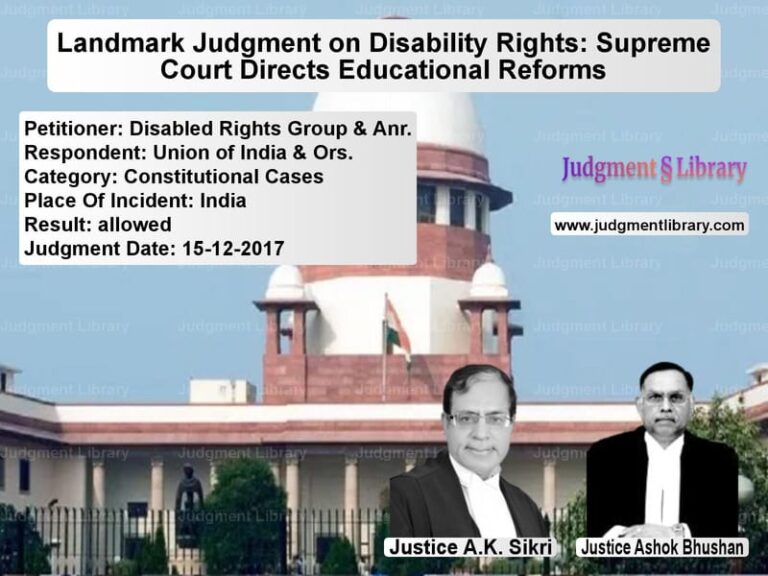Supreme Court Clarifies Tenant Rights Under Punjab Security of Land Tenure Act
The case of Shyam Lal vs. Deepa Dass Chela Ram Chela Garib Dass is a significant ruling that clarifies the rights of tenants under the Punjab Security of Land Tenure Act, 1953. The Supreme Court addressed whether a tenant retains statutory protection from eviction after the expiration of a fixed-term agricultural lease. The judgment has far-reaching implications for tenancy laws and agricultural lease agreements.
Background of the Case
The appellant, Shyam Lal, was a tenant under a fixed-term lease agreement. After the lease expired, the landlord, Deepa Dass Chela Ram Chela Garib Dass, sought his eviction. The landlord argued that since the lease period had expired, the tenant had no legal protection and must vacate the land.
The appellant, however, contended that under the Punjab Security of Land Tenure Act, 1953, he continued to enjoy statutory protection as a tenant and could not be evicted except on specific grounds enumerated in the Act.
Legal Issues Raised
- Does a tenant under a fixed-term agricultural lease continue to enjoy statutory protection after the lease period expires?
- Does the Punjab Security of Land Tenure Act override the provisions of the Punjab Tenancy Act, 1887 in determining the rights of tenants?
- What are the procedural requirements for evicting a tenant under the 1953 Act?
Arguments of the Petitioner (Shyam Lal)
The appellant, Shyam Lal, argued:
- That he was a self-cultivating lessee and, therefore, entitled to protection under the 1953 Act.
- That the definition of “tenant” under Section 2(6) of the 1953 Act includes sub-tenants and self-cultivating lessees.
- That the expiry of the lease period does not automatically terminate his tenancy.
- That the landlord had not followed the statutory procedure under Section 9 of the 1953 Act to seek his eviction.
Arguments of the Respondent (Landlord)
The landlord, Deepa Dass Chela Ram Chela Garib Dass, countered:
- That after the expiry of a fixed-term tenancy, the lessee ceases to be a tenant under the 1953 Act.
- That the Punjab Tenancy Act, 1887, allows for the termination of tenancy upon expiration of a lease agreement.
- That the tenant had no automatic right to continue possession beyond the agreed lease term.
Supreme Court’s Observations
The Supreme Court examined the interplay between the Punjab Security of Land Tenure Act, 1953 and the Punjab Tenancy Act, 1887. The Court made the following key observations:
- “A tenant under a fixed-term lease does not cease to be a tenant upon expiration of the lease if he continues in possession with the landlord’s implied consent.”
- “The 1953 Act provides statutory protection to tenants, and their eviction can only be carried out on the grounds specified in Section 9 of the Act.”
- “A landlord cannot unilaterally terminate a tenancy upon the expiration of the lease without following the procedure laid out in Section 14-A of the 1953 Act.”
Key Extracts from the Judgment
The Supreme Court ruled:
“The statutory protection granted to a tenant under the 1953 Act does not automatically terminate upon the expiry of a fixed-term lease. The tenant retains his status unless evicted in accordance with the provisions of the Act.”
The Court further observed:
“Eviction proceedings must be initiated under the 1953 Act, and the landlord must establish that the tenant falls within one of the grounds specified in Section 9.”
Final Judgment
The Supreme Court made the following rulings:
- The appeal filed by Shyam Lal was allowed, and the eviction order was set aside.
- The landlord was directed to follow the statutory procedure under Section 9 and Section 14-A of the 1953 Act if eviction was to be pursued.
- The tenant’s continued possession was declared lawful until such time as the landlord followed due process.
Impact of the Judgment
This ruling has several implications:
- It clarifies that agricultural tenants under a fixed-term lease do not automatically lose protection upon lease expiration.
- It reinforces the procedural safeguards for eviction under the 1953 Act.
- It prevents landlords from bypassing statutory protections through lease agreements.
Conclusion
The Supreme Court’s decision in Shyam Lal vs. Deepa Dass Chela Ram Chela Garib Dass strengthens the legal framework governing agricultural tenancy in Punjab. By affirming that statutory protection continues beyond lease expiration, the ruling ensures that tenants are not arbitrarily evicted. The judgment reinforces the importance of due process and legal protections for agricultural tenants, safeguarding their rights against wrongful eviction.
Don’t miss out on the full details! Download the complete judgment in PDF format below and gain valuable insights instantly!
Download Judgment: Shyam Lal vs Deepa Dass Chela Ram Supreme Court of India Judgment Dated 05-07-2016-1741873101873.pdf
Direct Downlaod Judgment: Direct downlaod this Judgment
See all petitions in Landlord-Tenant Disputes
See all petitions in Judgment by Ranjan Gogoi
See all petitions in Judgment by Arun Mishra
See all petitions in Judgment by Prafulla C. Pant
See all petitions in allowed
See all petitions in supreme court of India judgments July 2016
See all petitions in 2016 judgments
See all posts in Civil Cases Category
See all allowed petitions in Civil Cases Category
See all Dismissed petitions in Civil Cases Category
See all partially allowed petitions in Civil Cases Category

